Archbishop visits Hindu Temple to learn about Near Neighbours programme
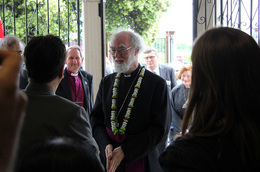
Thursday 7th June 2012
The Archbishop of Canterbury, Dr Williams, visited Shri Vallabha Nidhi Hindu Temple in Waltham Forest, north-east London to learn about the local projects taking place as part of the Near Neighbours programme.Dr Rowan Williams was joined by Eric Pickles MP, the Secretary of State for Communities and Local Government, to celebrate the work of the nationwide government-funded Near Neighbours Programme, which fosters links between different religions.
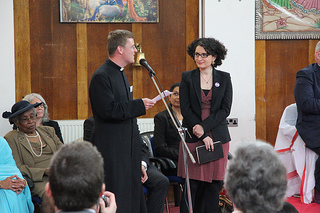 Following Morning Prayer at the nearby St Andrew’s Parish Church, members of the Parish walked with the Archbishop to the Hindu Temple, where local people explained their projects to the Archbishop and the Minister, giving a flavour of the valuable work being done with Near Neighbours grants.
Following Morning Prayer at the nearby St Andrew’s Parish Church, members of the Parish walked with the Archbishop to the Hindu Temple, where local people explained their projects to the Archbishop and the Minister, giving a flavour of the valuable work being done with Near Neighbours grants.
One such scheme was a 'Faithful Friendship club', which has been established to encourage worshippers from both sites to learn more about each other's cultures, food, music and beliefs.
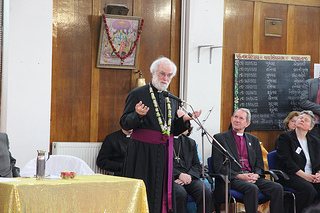 In his speech which followed the presentations, the Archbishop expressed his joy that ‘so much is going on because of this programme’.
In his speech which followed the presentations, the Archbishop expressed his joy that ‘so much is going on because of this programme’.
“It’s what we’ve been hearing about in different ways and different voices and different registers throughout the wonderful series of presentations. You can see that mutual responsibility coming alive as the Secretary of State has said across generations; within generations; between different communities of faith. And I must say I have been amazed and delighted to see that in this relatively small space in East London, so much is going on because of this programme.”
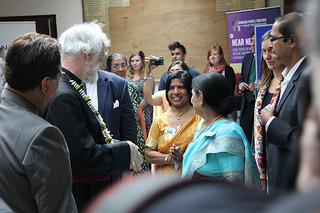 The Archbishop highlighted the significant role of the local community in achieving the programme’s success:
The Archbishop highlighted the significant role of the local community in achieving the programme’s success:
“I am really delighted to see the resources of this programme being used so creatively; so joyfully and imaginatively. I’m very glad that we’ve had the support we’ve had from the DCLG.”
“But of course, the real work; the real investment is done by you; is done within these communities. And there could not be a better testimony to the significance; the positive significance and the hopefulness of faith in our society than what we’ve heard about this morning.”
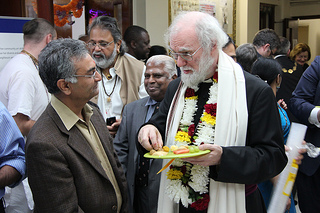 Near Neighbours Programme Director Liz Carnelley said: “It is great to see a Hindu temple and an Anglican church begin to work closely together, and to highlight the good work going on in local communities to improve neighbourhoods.”
Near Neighbours Programme Director Liz Carnelley said: “It is great to see a Hindu temple and an Anglican church begin to work closely together, and to highlight the good work going on in local communities to improve neighbourhoods.”
Near Neighbours works in areas where communities are diverse. The programme helps people from different faiths get to know each other better, and encourages people of different faiths or of no faith to come together for initiatives that improve their local neighbourhood. Near Neighbours is a government-funded project run through the Church Urban Fund.
The full text of the Archbishop’s speech is below:
Mr President, Secretary of State, Mr Mayor, honoured friends. It’s a very great delight to be able to be with you this morning to celebrate what is, by any reckoning, a state of extraordinary achievements: the achievements of trust, the achievements of hope, the achievements, as you’ve said, of compassion.
These projects show something of what we can do as a community; locally and nationally. And if I may shamelessly repeat something I said earlier this week in a slightly different context, it is very important that we have some worked examples of how these things are possible, not simply edifying words from archbishops or anybody else. We need to see that it can be done. This morning, in what has been presented to us, we have seen very clearly that it can be done.
I have two thoughts I want to share and leave with you about the vision of Near Neighbours. And the first is really to do with what makes a neighbourhood. And I think we really begin to understand that we live, as neighbours, in a neighbourhood when we realise that this environment doesn’t belong to any one of us, or any one group of us. This is everybody’s neighbourhood. This is everybody’s community, just as this is everybody’s world.
The things that go most badly wrong in our world are when we seek to take a community; a neighbourhood; a section of the globe as ours, not yours; not theirs. And it’s as we recognise that the neighbourhood is ours; that we share it, that we learn, as we heard earlier, how to shape a common response; a shared response to where we are; to identify the real problems that exist locally. Not the problems somebody else thinks we ought to have, or ought not to have; simply the problems we actually have. And that’s why this level of local cooperation; local discernment of insight is so very vital in all that we do, to build peace and harmony and lasting mutual understanding.
So that’s the first thing. The neighbourhood is everyone’s. The world belongs to all of us, not to any one of us. And it belongs to all of us because it belongs, first, to God. God, our maker, has given this world into our hands; the hands of the human race. Not this or that group, this or that class; even this or that faith. The world is in our hands. As creatures of God called to love and serve God, and to serve one-another.
And I use that picture of what is put into our hands to take me onto my second thought. If you watch religious people doing what religious people do - that is, pray - they do things with their hands. They bring their hands together. But they also open their hands. Certainly, religious traditions tell you this is how you approach God. You open your hands. You open your hands to what God wants to give you; not to what you think you must have. And the sign, you could say, of real atheism; real unbelief, is a clenched fist.
Now, we all try to keep our hands open before God. And what does God put into our hands? Well, He puts into our hands the creation we enjoy; the creation we share. But – and this is, I think, the heart of it – He puts into our hands the hope; the welfare; the good of our neighbour. He says to me “I am putting into your hands the hopes of your neighbour.” He says to my neighbour “I am putting into your hands his hopes; his needs.”
Because of that, we learn to take responsibility for each other, and we learn to receive the needs, the hopes and the concerns of the neighbour, and the gift that God gives us – not a burden; not a problem, but a gift. Now it’s when we see that gift to one another that community really does come alive.
It was one of the great sages of the early Christian century, St Anthony, who said to his disciples “Your life and your death are with your neighbour. Your life and your death are in the hands of your neighbour.” And so, working together, in an environment we share, in a world given to all of us, we open our hands and we say “Yes, we are willing to receive the concerns; the needs and the hopes of our neighbours as ours. They will receive mine as theirs.”
And that belief is what inspires this programme. It’s what we’ve been hearing about in different ways and different voices and different registers throughout the wonderful series of presentations. You can see that mutual responsibility coming alive as the Secretary of State has said across generations; within generations; between different communities of faith. And I must say I have been amazed and delighted to see that in this relatively small space in East London, so much is going on because of this programme.
Back to where I started, so much is possible. And we know that because so much is already happening. Like the Secretary of State, I am really delighted to see the resources of this programme being used so creatively; so joyfully and imaginatively. I’m very glad that we’ve had the support we’ve had from the DCLG.
But of course, the real work; the real investment is done by you; is done within these communities. And there could not be a better testimony to the significance; the positive significance and the hopefulness of faith in our society than what we’ve heard about this morning.
So I’ll end simply by thanking God and thanking you for that wonderful message; a positive side; a positive face of faith. Faith in friendship. Faith in neighbourliness and neighbourhood. Of course, also to say thank you to the Temple and to St Andrews for their hospitality this morning, remembering that hospitality is yet another of those things that we, as faith communities, do rather well when we put our minds to it.
We’ve been wonderfully received, wonderfully inspired, and I believe that we have a message that our country and our society really needs to hear. And that, by God’s grace, we have people around us prepared to deliver that message with conviction and joy and gratitude. Thank you.
